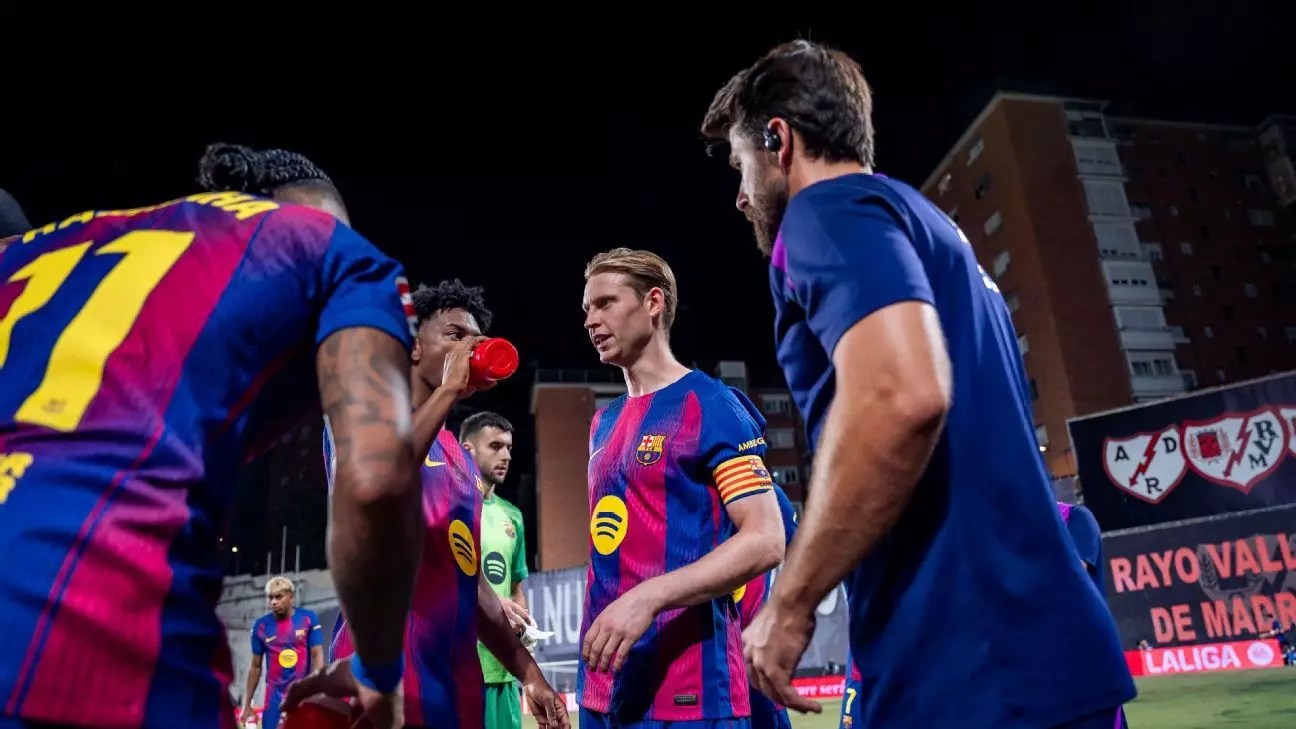Barcelona’s recent encounter against Rayo Vallecano has exposed more cracks than their season-opening hype suggested. After a promising start, many expected the Catalan giants to continue their winning streak comfortably. Yet, what unfolded was a sobering reminder that even the most talented teams face internal struggles and external obstacles. The draw reveals not just tactical lapses but also a deeper issue: a team struggling to find cohesion amidst high expectations. Hansi Flick’s candid critique underscores that beneath the surface of a seemingly promising start lie a series of avoidable errors, poor ball control, and lapses in concentration. This game shines a spotlight on the importance of mental sharpness and discipline—elements that, when lacking, turn potential victories into missed opportunities.
Barcelona’s performance, characterized by several unforced errors, suggests that the team’s foundation remains fragile. The praise for Joan García’s heroics might seem reassuring, yet it highlights how reliant the team has become on individual brilliance rather than collective resilience. A coach’s frustration with turnovers and sloppy passing indicates that systemic issues—perhaps related to tactical structure or psychological preparedness—are currently undermining the squad’s ability to execute under pressure.
Questionable Decisions and Controversies That Clouded the Match
One of the most contentious moments of the game involved the penalty awarded to Barcelona, initiated by Lamine Yamal’s clinical finish. The incident was marred by the malfunction of VAR technology, which deprived both teams of a fair review. This raises uncomfortable questions about the integrity of refereeing and technological systems in modern football. Relying on technology that fails at crucial moments undermines officials’ authority and fans’ trust, and it can tilt the game’s trajectory unexpectedly.
The controversy added an extra layer of chaos, disrupting the rhythm and focus of both teams. Yet, it also illuminated how such technical issues expose vulnerabilities in the game’s fairness system. While Barcelona capitalized on the penalty, their inability to maintain momentum afterward suggests that mental composure might be their more significant problem—a team that can’t capitalize on advantages or withstand adversity.
Keeper Joan García: The Unsung Hero Amidst Flaws
García’s standout performance deserves special mention. His six saves, including crucial stops from Raçiu and Jorge de Frutos, became the last line of defense that prevented a potentially humiliating defeat. His calmness with the ball and confident distribution hint at a promising future, yet it also signals that Barcelona’s overall structure is not yet robust enough to allow their goalkeeper to perform consistently without immense individual effort.
The signing from Espanyol for €25 million appears justified—yet, it raises questions about the team’s defensive stability and whether the coaching staff is doing enough to reinforce coherence at the back. Notably, Barcelona’s reliance on García underscores an underlying deficiency in their defensive organization, revealing that their ambition might be hindered by fundamental issues that require more than just talented shot-stoppers.
Midfield and Team Dynamics: An Emblem of Unfulfilled Potential
Frenkie de Jong’s expressed dissatisfaction with the team’s control and passing precision echoes a broader sentiment. For a club with a reputation for possession-based football, the lack of patience and strategic discipline is glaring. The early part of the season exposes how internal chemistry and tactical consistency remain works in progress. It becomes clear that individual talent alone cannot sustain dominance; collective effort and disciplined execution are the bedrocks of success.
Flick’s emphasis on team unity over individual egos rings true, especially considering the potential transfer turmoil knocking on their door. The impending transfer window closure adds a layer of uncertainty—players like Fermin López being linked with Premier League clubs threaten to destabilize an already fragile squad. Flick’s call for humility and genuine team spirit is not just wise but necessary if Barcelona hopes to realign and truly challenge their rivals.
Looking Ahead: A Season of Challenges and Opportunities
The season’s early stages serve as a reality check—Barcelona is not invincible, and their journey ahead demands more than talent. Flick’s leadership will be judged not just on results but on how well he manages internal cohesion and tackles the flaws that have surfaced. The team must evolve beyond reliance on individual brilliance and foster a collective mentality that can withstand setbacks.
As the transfer window closes, Barcelona’s focus must shift from reactive fixes to proactive reinforcement of their tactical and mental framework. Securing a stable core that can play under pressure, minimizing mistakes, and fostering genuine unity will be their true challenge. The early sign of resilience and the individual effort of players like García offer hope, but only if the entire squad collectively embraces improvement and discipline.
This season promises intense battles, and Barcelona’s true test will be their ability to translate individual talent into cohesive dominance—something that cannot be achieved through talent alone, but requires relentless effort, humility, and a clear institutional vision.


Leave a Reply